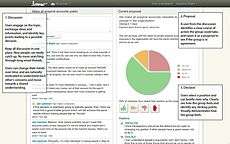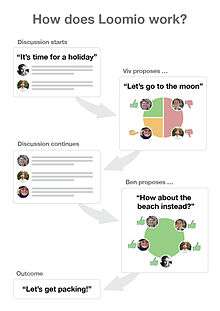Loomio
Loomio is decision-making software designed to assist groups with the collaborative decision-making process. It is a free software[3] web application, where users can initiate discussions and put up proposals.[4][5][6][7] As the discussions progress to initiating a proposal, the group receives feedback through an updatable pie chart.[5]
 A screenshot of Loomio in action | |
| Stable release | 2.2.6
/ 5 August 2020[1] |
|---|---|
| Repository | |
| Written in | Ruby, JavaScript[2] |
| Platform | web |
| License | AGPL v3[3] |
| Website | www |
Loomio was built by a core group of developers, based out of Wellington, New Zealand.[8] However, many contributors from all over the world have donated money and time, in an effort to fund the new platform.[9]
In 2014, Loomio raised over $100,000 via a Crowdfunding effort to develop Loomio 1.0. The Loomio 1.0 software supports mobile phone usage and other enhancements.[10] As of 2016, Loomio was used in more than 100 countries, with the software being translated into 35 languages.[11]
History
Loomio emerged from the Occupy movement. In 2012, it launched its first prototype. It was utilized in the Occupy movement in New Zealand. After using the first prototype in this, the team behind Loomio felt that it would be easier to give everyone a voice with an online software, leading to the launch of Loomio 1.0. Since the launch of Loomio 1.0, Loomio has stopped using occupy hand-signals in the interface. It has since been developed into a social enterprise, and linked to the popular trend of "platform cooperativism".[12][13]
Operation

The top-level organizational structure in Loomio is the group. A group is made up of members, who are granted permission to that group. Groups can be both public and private, permitting for both privacy and transparency.
Within the groups, members create discussions on specific topics. During a discussion, members of the group post comments and create proposals.
Proposals solicit feedback from members on a specific proposition. Members can either agree, disagree, abstain, or block. Blocking is essentially a strong form of disagreement.
Funding
Loomio is funded through contracts with government and business, and donations from its users.[14]
Reception
Loomio has been used by the Wellington City Council for discussion with their citizens.[15]
The Pirate Party of Hellas used Loomio[16][17] to create 461 groups, covering 18 federal departments, 13 regions of Greece, 23 prefectures, and hundreds of counties and municipalities. The Internet Party of New Zealand also used Loomio to develop policy during the campaign for the 2014 General Election.[18]
El Partido Pirata de Chile has also adopted Loomio through their own fork called Lumio, offering a slightly different translation into Spanish for the voting options aiming at both remarking the importance of consensus and improving language style by using verbs in the first person singular (Concuerdo, Discrepo, Me abstengo y Solicito Reformluar). Additionally, the PPCL has promoted the use of Lumio in different areas of political discussion and group coordination inside and outside the Party.[19]
Loomio won the MIX Prize Digital Freedom Challenge in April 2014.[20]
Projects using Loomio
Prominent projects that use Loomio for collaborative work based on democratic process:
- Students for Cooperation[21]
- Podemos (Spanish political party)[22]
- Diaspora*[23]
- Real democracy[24]
- Pirate Party of Belgium[25]
See also
References
- "Releases - loomio/loomio". Retrieved 5 August 2020 – via GitHub.
- "loomio/loomio". Github. Retrieved 27 August 2014.
- "loomio/LICENSE.txt". Retrieved 27 August 2014.
- Pullar-Strecker, Tom. "Group decision-making software ready to run". Retrieved 30 October 2013.
- "Can Social Software Change the World? Loomio Just Might". Retrieved 30 October 2013.
- "Occupy Democracy: Loomio attempts to re-invent group decision-making… as a co-op". Retrieved 31 October 2013.
- de Taar, Charlie. "InterTwinkles: Online Tools for Non-Hierarchical, Consensus-Oriented Decision Making" (PDF). MIT. Retrieved 10 November 2013.
- "Loomio - The Enspiral Network". Enspiral Foundation. Archived from the original on 5 September 2014. Retrieved 27 August 2014.
- "Contributors to loomio/loomio". Github. Retrieved 27 August 2014.
- "Out in the Open: Occupy Wall Street Reincarnated as Open Source Software". Wired. 28 April 2014. Retrieved 28 April 2014.
- Schneider, Nathan (26 April 2016). "How a Worker-Owned Tech Startup Found Investors—and Kept Its Values". Yes Magazine. Retrieved 8 January 2020.
- Nathan Schneider (April 26, 2016). "How a Worker-Owned Tech Startup Found Investors—and Kept Its Values". YES! Magazine.
- Jackson, Sam K.; Kuehn, Kathleen M. (2016-10-14). "Open Source, Social Activism and "Necessary Trade-offs" in the Digital Enclosure: A Case Study of Platform Co-operative, Loomio.org". TripleC. 14 (2): 413–427–413–427. ISSN 1726-670X.
- "Loomio Launches Exciting Collaboration with Wellington City Council". blog.enspiral.com. 15 March 2013. Archived from the original on 6 November 2013.
- "Loomio used for large scale citizen democracy project in Greece". blog.loomio.org. 14 March 2014.
- "The Largest Loomio Project Yet". techpresident.com.
- "LOOMIO GIVES POLICY POWER TO MEMBERS". Internet Party of New Zealand. Archived from the original on 3 September 2014. Retrieved 27 August 2014.
- Partido Pirata de Chile (8 June 2017). "Declaración Pública Partido Pirata de Chile sobre el Uso de herramientas digitales para mejorar la democracia". www.partidopirata.cl.
- Lumio (3 April 2014). "Wellington Tech Startup Loomio Wins International Award". Scoop.co.nz.
- "Archived copy". Archived from the original on 2016-06-02. Retrieved 2016-01-17.CS1 maint: archived copy as title (link)
- "Archived copy". Archived from the original on 2015-04-15. Retrieved 2015-02-10.CS1 maint: archived copy as title (link)
- "Diaspora* project wiki". Retrieved 2014-10-29.
- "Realdemocracy project website". Retrieved 2014-10-29.
- "Loomio group of Pirate Party of Belgium". Loomio.org.